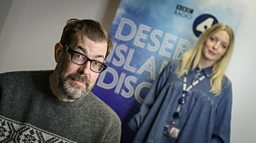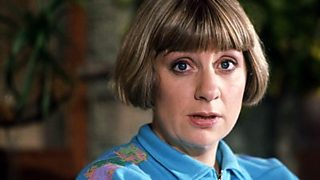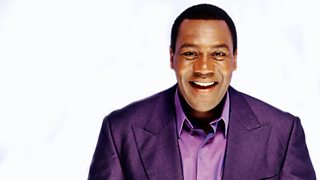12 things we learned from Richard Osman's Desert Island Discs
Richard Osman is a broadcaster, TV producer and writer, familiar in millions of homes as the co-host of the ���˿��� One quiz show Pointless. More recently, his murder mystery novels have propelled him to the top of the bestseller lists. For 20 years Richard worked behind the camera, developing and producing shows including Total Wipeout, Deal or No Deal and 8 Out of 10 Cats. He has co-hosted Pointless since 2009.
Here's what we learned from his Desert Island Discs:

1. The shared experience of TV viewing inspired a lifelong love of television
Now families can sit in the same room watching four different shows on four different devices, but Richard values the togetherness TV could bring: “We've lost a bit of that thing that we used to have in the 70s and 80s with everyone watching the same thing at the same time. But that's still in our folk memory and that's the thing that I loved. And that's the reason I love working in television so much.”
Although we now have fewer big shared moments, Richard also loves today’s multiplatform world: “It's great. Bring it on!” he laughs. “It encourages more voices, different people. There's so many more people working in this industry now, and so many people who are able to get a break in this industry.”
2. It takes two to make a quiz more fun
“The best thing about a quiz is to always play in pairs because you can then have questions that people can chat about with each other,” Richard believes. “Pointless is more fun because there's pairs playing, and so you always have an opinion of a pair of people. If there's a married couple, you've always got an opinion about who’s married well!”
“Quite often on Pointless - this is terrible, I shouldn't say it, but we always do it - there'll be a man and a woman, and... they'll say we're friends and you just go: ‘I don't know about that really... She’s friends but I think he wants to be more than friends.’ If you see two people who have a relationship it’s impossible not to have a little gossip about that relationship,” laughs Richard.
3. Richard’s first disc takes him back to childhood TV viewing – and much more
“Talking about television and how meaningful that was for me growing up, there’s one song that to anybody over a certain age just screams television and screams that shared television experience and a love of our country and our culture.”
The song is Bring Me Sunshine by Morecambe and Wise, which they sang at the end of their shows. In 1977 more than 20 million people watched the Morecambe and Wise Christmas Show.
4. His brother’s appearance on Top of the Pops taught him that anything is possible
“My brother Mat is three years older than me and he was always in bands. He was always playing his bass and he formed a band with Brett Anderson when they were in their teens and they became Suede,” says Richard. “So my second song is the one they did on Top of the Pops and it was like someone had punched a hole in the sky for me.”
“You just think ‘Wow, we're from where we're from, and you're on Top of the Pops with your friends doing these songs. And I was so proud of him. And also, selfishly, I thought ‘Oh, we can do it. There's opportunities out there. You can make it if you want. I'll never forget it as long as I live.”
The song is Metal Mickey by Suede.
5. A lifelong eye condition hasn’t held him back in an industry focussed on what we can see
Richard was born with nystagmus – a condition which causes uncontrolled eye movement.
“The world is essentially in soft focus all the time,” he explains, “so it's like being in the fog all the time. Some people have it worse than me, some people have it and don't notice... When I was at school I could never see the board. I couldn't see the textbooks in front of me. I can't see the birds in the trees.”
“And TV – of course - is a visual medium, and if I'm ever sitting in an edit I can't see if a boom has come into shot, I can't see if something looks good, I'm just listening. I just listen to what's happening. If I'm presenting I can't read an autocue... which means I make stuff up, which means hopefully when you do long running shows they feel fresh because you're not saying the same thing all the time, which is easy to fall into.”
"I've been able to use it to my advantage, but yeah, I'd rather be able to see well - that would be great. I would love that. But I see beautiful things sometimes that no one else would ever see because I see a haze in the distance, and you know it's a building and I don't. I just see this beautiful kind of experimental painting.”

6. Sport has inspired his best ideas for TV games and quiz shows
“All of my TV success really comes from sport. I've always loved sport and in sport you’ve got leagues, you've got knockout cups, you've got things like the Ryder Cup where you've got individuals playing against each other, then pairs playing against each other.”
Almost everything you ever do is going to fail - that's the truth and I always say: 'Fail well’Advice from Richard Osman
This organisational element in sport inspired him to devise quizzes and television formats when he was growing up.
“Watching TV - Family Fortunes and all these types of shows and Blockbusters - my brain was interested in how they put it together. My brain was going: ‘OK, why have you done that? Why have you made that decision?’ I just love doing it. It's what it's what I love to do.”
"When I was 12 I made up the World Cup of Music. I picked the 16 best bands and then they’d play-off against each other in knockout competitions.”
“Years later, on Twitter, I was doing the same thing like the World Cup of Christmas Sweets and the World Cup of Crisps, and of Christmas films. I raised money for charity and - again it keeps happening - I would look back and go: ‘OK yeah, that's what you used to do but now you're monetising it…I even did a book the World Cup of Everything which I dedicated to the 12-year-old me just to say ‘I’m still doing it’ but now it’s in bookshops.”
7. It's very painful when a new show is a flop – and it’s vital that you learn from the experience
“Almost everything you ever do is going to fail,” says Richard. “That's the truth and I always say: ‘Fail well.’ If you're doing a show, or if you've written off to someone, make sure even if it fails that you make a good impression.”
“I remember I did a TV show called Boyz Unlimited [a spoof boy band series with James Corden] which failed really badly. It came off air after one series and I was devastated when it came off air and it stopped me writing for years and years.”
“I had a meeting with the commissioners who took it off air and [afterwards] I wrote them both a letter and I said: ‘Look that must have been a really hard meeting for you... I absolutely loved working with you. Thank you so much and I'd love the opportunity to do it again.’”
“And I was really hurting when I wrote that letter, but that's the letter to write because so many people in telly or anywhere would just go: ‘You've got it wrong, how dare you, you don't understand my vision...’ Well, they're not going to work with you again.”
8. He speaks openly about his food addiction
“My addictive behaviour has always been food since I was incredibly young. [Food addiction] doesn’t have any of the doomed glamour of drugs or alcohol but if an alcoholic came to my house they would be shocked to see that there are bottles of gin and bottles of wine completely untouched. If I came to your house and there were crisps and chocolate bars untouched in the fridge I’d be like ‘What – how are they untouched?’ if I’m going through an episode.”
“And food is a tricky one because booze and drugs you can give up – [it’s] unbelievably difficult but a zero tolerance policy, whereas if you’re addicted to food or to love or all these things that are sustaining, you do still have to have them and so it’s quite a hard one to work your way out of.”
He says his addiction will be with him for the rest of his life. “I’m either controlling it or not controlling it at any given time and these days I control it more often than I don’t but it’s actually quite hard and sometimes you do slip but I try my best and I certainly have no shame about it now.”
9. Richard wasn’t meant to be the co-host on Pointless
Richard took on the role while the show was being developed and ended up with the on-screen job.
“The only thing that’s ever terrified me about TV is the studio audience. The camera I'm fine with and knowing people are at home having their tea, that's what I'm fine with, but when I'm in front of some raked seating and there's members of the public looking at me, then I think: ‘What on earth am I doing here?’ I feel such a fraud. I remember the first day if you'd said to me just before we went on: ‘Honestly, we can replace you with Bradley Walsh now.’ I would've gone: ‘Yeah, please do, please. Honestly I don't need it,’ but I'm so thrilled that I did it.”
10. One of his eight discs reminds him of the fun he has working on Pointless
“One of my favourite bits of any day on Pointless and always has been right from the start is sitting in the make-up room – about 45 minutes before the show. My make-up artist is Pauline, and Xander’s [co-presenter Alexander Armstrong] is Debbie. Sharon from wardrobe often comes in and those 45 minutes bring me such joy. We have such fun just gossiping. We’ve been together for 12 years and we’ve always played songs in the make-up room, certainly in the early days to gee us up.”
The song is American Boy by Estelle featuring Kanye West.
11. Richard advised his son to ‘own his height’
Richard is 6ft 7” tall, and his son is only two inches shorter.
“I grew up very, very awkward. I couldn't see, I was six foot seven, I couldn't have been more physically ashamed and I've had years of coming to terms with it.” And so he felt it was important to give his son some guidance: “I said when you walk into a room you've only got two options. Everybody in that room is either going to say: ‘Wow, who's that really tall guy? Or they're going to say: Who's that really tall guy who looks really awkward about being tall? You don't have
another option which is Who's that ordinary sized guy? It just doesn't exist, so when you walk into a room, you’ve just got to own your height.”
12. He used one of his favourite formats to decide on his Desert Island book
“I can’t help turning everything into a format so firstly I was thinking it’s got to be some short stories because then you’ve got a bit extra to dip into. Then I think is it crime or is it humour? So I drew two semi-finals which were PG Wodehouse vs Alan Bennett and PG Wodehouse won that and I had Agatha Christie vs Patricia Highsmith and Agatha Christie won that so it was a Christie-Wodehouse final and the Poirot book of short stories would be the book that I would take – well played everyone!”






